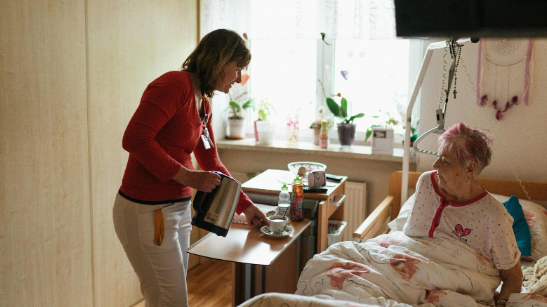Confronting Ageism in Healthcare
Confronting Ageism in Healthcare

Ageism in healthcare is prejudiced or discriminatory behavior against individuals based on their age, which significantly impacts older adults, leading to unequal treatment and inferior care. It is important to address ageism, as it can negatively influence the overall health and quality of life of older adults. By understanding how ageism manifests and finding ways to confront it, healthcare providers, policymakers, and patients can help create a more inclusive healthcare system.
The Impact of Ageism in Healthcare
Ageism in healthcare can present itself in both subtle and overt ways. Implicit ageism involves unconscious biases, where healthcare providers may unconsciously dismiss symptoms as being simply due to aging rather than thoroughly investigating them. For example, an older person complaining of dizziness or weakness might not get a comprehensive range of diagnostic tests because they are considered "normal" for their age. This can lead to serious health conditions being overlooked or misdiagnosed. Similarly, explicit ageism involves more direct discrimination, where older adults might be deemed less deserving of certain medical treatments or prioritized lower than younger patients in care decisions.
Studies have shown that ageism can lead to increased physical and cognitive issues among older adults. When healthcare providers hold negative stereotypes about aging, they may underestimate the potential for recovery and rehabilitation in older patients, leading to less aggressive treatment plans. This can cause older adults to experience a decline in health faster than they otherwise would simply because they are not receiving the necessary interventions.
Ageism also affects the mental health of older individuals, contributing to feelings of worthlessness, anxiety, and depression. When older adults internalize ageist attitudes, they may become less likely to seek medical care or advocate for themselves, believing their health concerns are not worth addressing.
Elderspeak and Its Consequences
One common manifestation of ageism is "elderspeak," a form of condescending communication where healthcare providers speak to older adults using simplistic language, terms of endearment, or a singsong tone. Examples include phrases like "sweetie" or "honey" or speaking slowly and loudly as if addressing a child. While some may believe this form of speech is helpful or comforting, it often has the opposite effect. Elderspeak can make older adults feel disrespected, patronized, and infantilized, reinforcing a power imbalance between healthcare providers and patients.
Elderspeak can also negatively affect older patients' behavior and cooperation. Older adults, particularly those with dementia, may respond to elderspeak with increased resistance, aggression, and anxiety. This can create a more challenging environment for patients and caregivers, leading to less effective care and increased stress for healthcare workers. In order to prevent such from happening, healthcare workers need to maintain professionalism and treat older adults with the same respect as any other patient. Healthcare providers can create a more positive and supportive environment, improving the quality of care and patient cooperation.
Crisis Standards of Care and Explicit Ageism
Explicit ageism in healthcare is particularly evident in crisis standards of care, which are guidelines for allocating limited medical resources during emergencies. During times of crisis, such as natural disasters or pandemics, healthcare systems may become overwhelmed, and difficult decisions must be made about who receives care. Unfortunately, these decisions have sometimes prioritized younger patients over older ones based on the belief that younger individuals have more years ahead of them. Such criteria devalue the lives of older adults and can lead to discriminatory practices in healthcare.
The COVID-19 pandemic brought this issue to the forefront, with some states implementing crisis care standards that explicitly favored younger patients. This approach not only perpetuated ageist beliefs but also led to tragic outcomes for many older adults, particularly those in long-term care facilities. In response, the Office for Civil Rights at the U.S. Department of Health and Human Services emphasized the need to prevent
age-based discrimination in healthcare policies. Efforts are underway to revise crisis care guidelines to ensure that all individuals, regardless of age, have equal access to life-saving treatments.
Changing the Narrative Around Aging
Changing societal attitudes towards aging is the first thing in the fight against ageism. Public awareness campaigns and educational initiatives can help challenge negative stereotypes and promote a more positive view of aging. Some campaigns use evidence-based strategies and innovative communications to combat ageism. This initiative seeks to create a world where older adults are valued, respected, and given the same opportunities for care and well-being as younger individuals.
Encouraging healthcare providers to reflect on their attitudes and biases towards aging is necessary for fostering more equitable and compassionate care. Continuous education and training are key in helping professionals recognize and confront their implicit biases. Also, it's important to include older adults in conversations about their health, respecting their autonomy and decision-making abilities.
Empowering Older Adults to Advocate for Themselves
Empowering older adults to advocate for themselves is important in confronting ageism in healthcare. Older patients should feel confident expressing their concerns, asking questions, and seeking second opinions if necessary. They should be encouraged to participate actively in their healthcare decisions, leading to better outcomes and greater satisfaction with their care.
Healthcare providers can play a key role in fostering this empowerment by creating a supportive environment where older adults feel heard and respected. This involves actively listening to patients, providing clear and accurate information, and involving them in discussions about their treatment options. When older adults feel their voices are valued, they are more likely to participate in their care and make informed decisions that benefit their health.
When older adults face challenges in advocating for themselves, especially those with cognitive impairments, having the backing of family members, caregivers, or patient advocates becomes crucial. These advocates can assist older adults through the healthcare system, facilitate effective communication with providers, and make sure their needs and preferences are addressed. It's also beneficial to involve geriatric specialists, like geriatricians and nurses, to offer personalized care tailored to the unique health concerns of older adults.
The Role of Education and Training in Combating Ageism
Education and training are fundamental in combating ageism within healthcare settings. Healthcare providers must know how ageism can influence their interactions with older patients and the quality of care they provide. Training programs should focus on helping providers recognize their implicit biases, understand the impact of ageism, and develop strategies to deliver equitable care.
Training should also emphasize the importance of person-centered care, which involves treating patients as individuals with unique needs, preferences, and experiences. By adopting this approach, healthcare providers can move away from age-based assumptions and offer care that respects the dignity and autonomy of older adults. This approach fosters a more inclusive healthcare environment where all patients feel valued and respected regardless of age.
Moving Towards Age-Inclusive Healthcare
Confronting ageism in healthcare requires a collective effort from healthcare providers, policymakers, and society. By challenging negative stereotypes about aging, advocating for policy reforms that protect the rights of older adults, and promoting education and training on ageism, we can create a healthcare system that is inclusive and respectful of all individuals, regardless of age.
Healthcare organizations can also significantly contribute to promoting age-inclusive practices by adopting policies that prioritize equitable care for older adults, providing resources and support for geriatric care, and encouraging ongoing professional development on issues related to aging. By leading the way in age-inclusive healthcare, these organizations can set a positive example for others to follow and help drive meaningful change.
At
Bayou Bend Health System, we are committed to providing compassionate, high-quality care to all our patients, regardless of age.
Contact us directly for more information about our services and how we can support you or your loved ones.



